
MACAU: THE SCHOOL OF ST. PAUL PIONEERING
THE USE OF MODERN TECHNOLOGY
IN THE FIELD OF EDUCATION
 Saint Paul School (Escola São Paulo) is a diocesan school run by the Dominican Fathers and one of the leading schools in Macau imparting education to a population of nearly three thousand students.
Saint Paul School (Escola São Paulo) is a diocesan school run by the Dominican Fathers and one of the leading schools in Macau imparting education to a population of nearly three thousand students.
After considering many ways to improve the education level of the school, the Administration of St. Paul’s School, under the direction of Fr. Alejandro Salcedo OP (Director), in coordination with Fr. Jose Angel L. Legido, OP (Administrator) Fr. Athanasius Cheng OP (Director of the Pastoral Care Department), the ICT Department, the Curriculum Department, and the different school workteams, has decided to implement the “Classroom 2012 Project†in a way that is considered pioneer in Asia and even in Europe.
The project will make heavy and comprehensive use of proven information technologies and is designed to cater for and adapt to the need of all the teachers and students, as well as to improve the interaction in between teachers, students and parents, thus taking the basic principle of the school’s education policy, ESOS, short for Empowering Students for an Open School, to a new level.

Basically, the school is building an integrated computerized system that will allow parents to monitor in real time the activities and progress of their children, teachers to share and prepare their lessons from a wealth of online resources, students to review their lessons from home as if they were at the school and submit their work or questions to their teachers from the Internet.
Students will not be using “traditional†text books any more, and each will be provided with a “tablet pc†where the curriculum for each school year will be downloaded, so that the curriculum can include rich content like power point presentations, videos, etc. that can help the students understand the subject better. Apart from this, each teacher can also include other relevant material, as well as homework, automatically. Teachers will also be able to poll their students in real time to test how a particular lesson has been understood by the students.

Classroom 2012 Project will be implemented from September 2012 on a pilot basis that will include one class from Primary 4, Form 1 and Form 4, on two subjects: Mathematics and English. After the pilot, the project will be reviewed by the Education Department of Macau’s University of Science and Technology to see comparative results with the rest of “traditional†students, and to pinpoint any shortcomings of the system that need to be solved. In September 2013, the project will be implemented for all classrooms of Primary 4, Form 1 and Form 4 on all subjects and in September 2014 the project will be implemented in the whole school.
The scope and the design of the system has been very favorably considered by worldwide information technology companies like Microsoft, Cisco, etc, as well as education entities like the Education Department of Macau’s Government and the education faculties of several universities in Macau. All of them will support the project to make sure it is a success. (JALL)

About Us
Due to the growing number of vocations to our PROVINCE OF OUR LADY OF THE ROSARY, a House of Studies was recently formed in Macau. It was established in September 2007. It was raised to the status of a PRIORY in 2008. As such the full monastic lif e is carried out: a life of PRAYER, STUDY, COMMON LIFE and PREACHING. Here students are prepared for the Dominican Religious life in the Province of Our Lady of the Rosary. We pray the Divine Office daily and on Sundays and Feast Days we chant it. The Divine Office is carried out within the Mass on ordinary days, but on Sundays and Feast Days it is prayed as part of the Mass.
e is carried out: a life of PRAYER, STUDY, COMMON LIFE and PREACHING. Here students are prepared for the Dominican Religious life in the Province of Our Lady of the Rosary. We pray the Divine Office daily and on Sundays and Feast Days we chant it. The Divine Office is carried out within the Mass on ordinary days, but on Sundays and Feast Days it is prayed as part of the Mass.
The Order of Preachers is made up of several Provinces, areas usually within a country, where Priories or Houses are established. As a young man, St. Dominic had a dream: to go as a missionary to the “Cumans,†that is, to some pagan tribes of Eastern Europe, and hopefully, to die a martyr’s death. In other words: to be missionary amongst non-Christians. However, as we have seen, Divine Providence directed him instead to Albigensian territory in Southern France. There he labored unceasingly for long years. But he never forgot his dream.
It is said that towards the end of his life he grew a beard in the hope of being able to fulfill his dream. Again, this was not to be. Was Dominic’s dream lost forever when he died at Bologna, Italy, in 122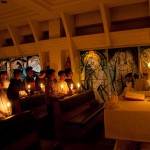 1? No, it wasn’t. Some of the early followers, led by St. Hyacinth of Poland, did missionary work in the very territories of Dominic’s dream. Others soon started preaching the Gospel in Muslim North Africa and the Middle East. Later, upon discovery of the American Continent, large numbers of Dominicans from Spain flocked there, contributing immensely to the evangelization of the South, Central and North America. At about this time, Portuguese Dominicans established missions in some parts of Asia (Goa in India, and Macau in China). All this was good and fruitful work. Still, it did not quite catch the fullness of Dominic’s ideal. Something else appeared shortly afterwards; and that was the establishment in 1587 of the DOMINICAN MISSIONARY PROVINCE OF OUR LADY OF THE ROSARY. This indeed marked a significant milestone in the development of the idea of mission. Up to that time, it had been individual Dominicans from different Provinces going to mission lands while the rest continued their apostolate in Europe. They were, so to speak, Provinces “with missions.†Now there was a province so essentially missionary that all its members went to mission lands.
1? No, it wasn’t. Some of the early followers, led by St. Hyacinth of Poland, did missionary work in the very territories of Dominic’s dream. Others soon started preaching the Gospel in Muslim North Africa and the Middle East. Later, upon discovery of the American Continent, large numbers of Dominicans from Spain flocked there, contributing immensely to the evangelization of the South, Central and North America. At about this time, Portuguese Dominicans established missions in some parts of Asia (Goa in India, and Macau in China). All this was good and fruitful work. Still, it did not quite catch the fullness of Dominic’s ideal. Something else appeared shortly afterwards; and that was the establishment in 1587 of the DOMINICAN MISSIONARY PROVINCE OF OUR LADY OF THE ROSARY. This indeed marked a significant milestone in the development of the idea of mission. Up to that time, it had been individual Dominicans from different Provinces going to mission lands while the rest continued their apostolate in Europe. They were, so to speak, Provinces “with missions.†Now there was a province so essentially missionary that all its members went to mission lands.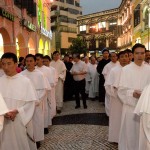
This new Province brought about a further unique feature in the history of the Order: the fact that it had no territory of its own, say in France or Spain or somewhere else, as all the other Provinces had since their foundation, but became rather the personification of the “itinerant†apostles o fold among the non-Christian peoples of Asia, ready to go and work wherever a door was opened to them. And so, to Asia they came, nearly two thousand strong, over a period of four hundred years, to work in the Philippines, Vietnam, China, Taiwan, Japan, Hong Kong and, later, to Korea, Singapore and Macau.
And so among the many Provinces was added the Province of Our Lady of the Rosary. The spirit that animates a true member of this Province of Our Lady of the Rosary, can summarized under the three following headings: ad gentes (to non-Christian peoples); be extra (outside one’s own country) be vitam (for life, a life-time commitment, and nor just for five or ten years). It must be noted, however, that since the over-all consideration in Preaching is the needs of the people of God, including those of the preacher himself, it may happen that, owing to special circumstances, such as the establishment of the Order in a particular territory, or in the context of what the Pope has described a s the “New Evangelization†of traditionally Christian countries that are in need of a revival of faith, some members of the Province of Our Lady of the Rosary may be working somewhere else.
The qualifyin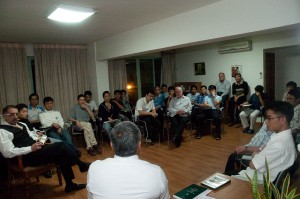 g feature still stand that this is essentially a Missionary Province and that, therefore, the basic attitude and disposition of all its members should in principle be the three “ads†just mentioned. With the establishment of the Province of Our Lady of the Rosary, Dominic’s dream of becoming a missionary in pagan lands and of dying a martyr’s death came true in extraordinary abundance in his sons; for, throughout the entire history of this Province, an impressive number of members (Europeans and Asians, Friars and Sisters, Lay Dominicans and others belonging to Dominican Confraternities) gave their life for the faith they preached and are now acclaimed as Saints of the Church. Among them just to mention two, St. Francis Fenandez de Capillas, Protomartyr of China and St. Lorenzo Ruiz, the first Filipino saint. Now you know who the DOMINICANS ARE and WHAT THEY DO, and in particular about the Dominicans of the PROVINCE OF OUR LADY OF THE ROSARY. A HIGH IDEAL, isn’t it? Yes, high it is, and high indeed it must be, coming, as it does, from above.
g feature still stand that this is essentially a Missionary Province and that, therefore, the basic attitude and disposition of all its members should in principle be the three “ads†just mentioned. With the establishment of the Province of Our Lady of the Rosary, Dominic’s dream of becoming a missionary in pagan lands and of dying a martyr’s death came true in extraordinary abundance in his sons; for, throughout the entire history of this Province, an impressive number of members (Europeans and Asians, Friars and Sisters, Lay Dominicans and others belonging to Dominican Confraternities) gave their life for the faith they preached and are now acclaimed as Saints of the Church. Among them just to mention two, St. Francis Fenandez de Capillas, Protomartyr of China and St. Lorenzo Ruiz, the first Filipino saint. Now you know who the DOMINICANS ARE and WHAT THEY DO, and in particular about the Dominicans of the PROVINCE OF OUR LADY OF THE ROSARY. A HIGH IDEAL, isn’t it? Yes, high it is, and high indeed it must be, coming, as it does, from above.
The challenge is certainly great, and it demands generosity of heart. But the Lord who calls, shares with his own generosity. He tells us too – as he did his disciples, as he did St. Dominic- to “Go and preach.†However, not alone. “And rememberâ€, He adds, “I am with you always, to the end of the age†(Mt 28:20). Do you feel in your heart a desire to join the Dominicans, and, more specifically, the Dominican Missionaries of the Province of Our Lady of the Rosary? Do pay attention to this feeling. It may be the voice of the Lord calling you to the Religious Life. Indeed, Religious Life, Dominical life, Missionary life…a life-time journey through which the vocation and the mission keep constantly unfolding, discovering new dimensions and opening up to new possibilities; step by step bringing a man closer to the ideal that first attracted his attention and made him embark on that journey; day after day increasing in his heart the joy and happiness of knowing that, as a “special friend,†he has been chosen to be “in the service of his Master,†And this, in spite of the fact that, inevitably, difficulties and obstacles appear on the way, and perhaps even crises and failures. Faith is needed- and Trust – because faith without trust is not faith in the Lord who calls, who sends, and who accompanies us. Faith and Trust are needed in our Mission as Preachers! St. Paul who knew Christ well and all about preaching, offers us some encouraging advice: “I know him in whom I have put my trust, and I am sure that he is able to guard until that Day what I have entrusted to him†(2 Tim 1:12).
Fr. Lionel XevierO.P
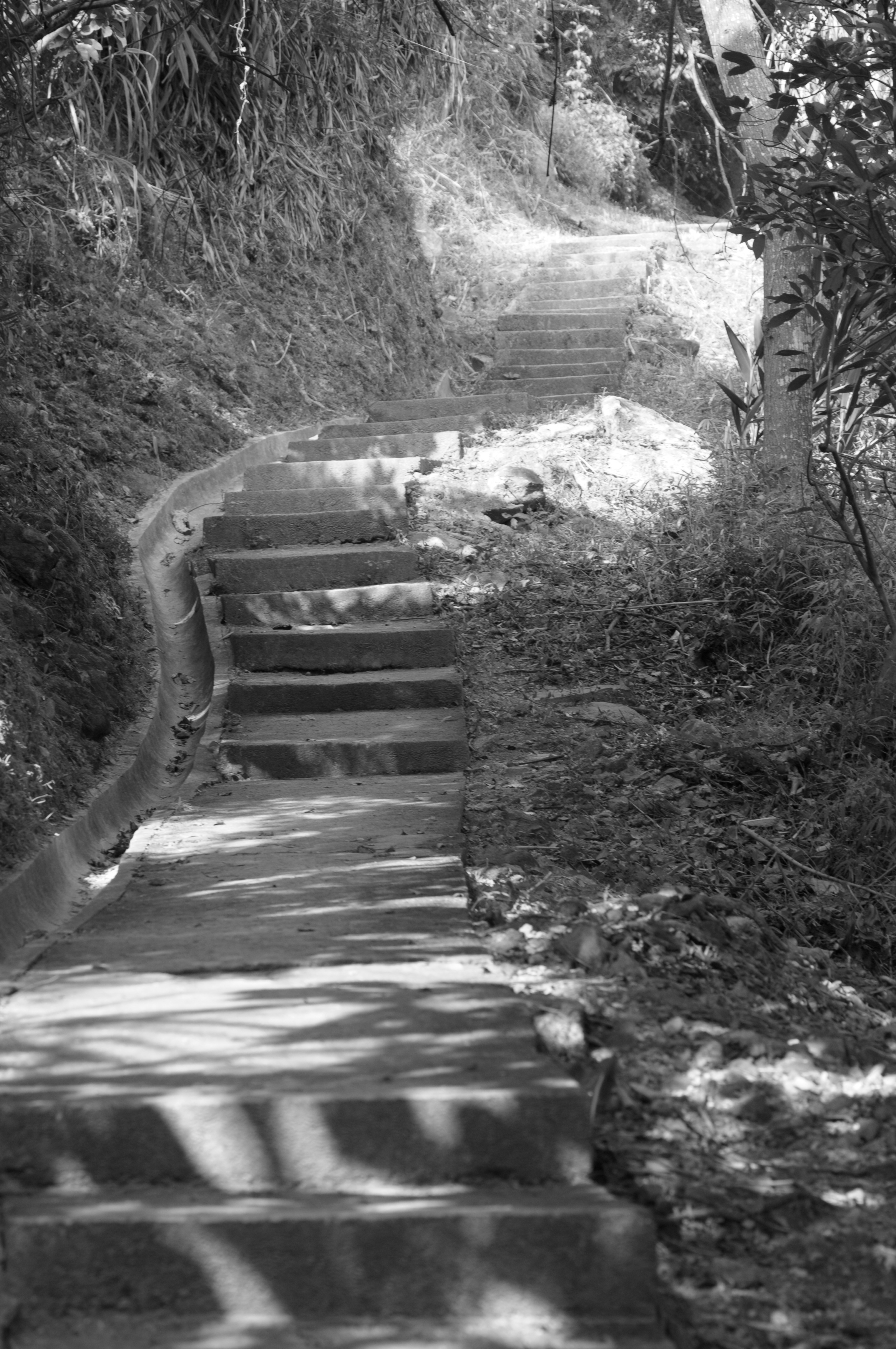
Being assigned to take charge of Spirituality, I suppose my job is to find and to write reflections on spirituality as an integral aspect of religious experience. As a Dominican, the first thing I would like to reflect on is, of course, about the Dominican spirituality. This also attempts to envision what we are going to do for this column as well as to explain that further reflections on faith may be coloured with some Dominican light.
To our many brothers, Dominican spirituality is something uneasy to define. Though the official name of the Dominicans’ is the Order of Friars Preachers, which is historically true that we were exclusively called to “the proclamation of the word of God,”* there are, however, many people nowadays who can preach and even preach well, in words and in deeds. We seem no longer different from them. Nevertheless, the fact that we choose to become Christian “in the form devised by St. Dominic”* is obviously a matter of choice!
We know that St. Dominic when encountered heretics on a journey in France his opinion was that the people were not to blame, but the preachers. If there are good, orthodox preachers, then the people will be good and orthodox also. His zeal for the salvation of souls had urged him, embracing a life of poverty in spirit, to dedicate his life seeking the Truth so as to share the Truth with other people. Following St. Dominic’s spiritual practice of living out our faith, we are traditionally known for the love of preaching and the devotion to truth.
Apart from setting a good example for his brothers and sending them to university to advance their knowledge, St. Dominic did not explicitly constrain his brothers into any particular form of life. We have no unique spirituality of our own, do we? Though the priority of our vocation is to reach perfection in Christ, not to stand out in the crowds, we still need to know what make us who we are.
Probably St. Dominic agreed with Laozi when he said, “Any dao that can dao is not a constant dao. [Because] any name that can name is not a constant name.” A named way of approaching God and of living out the Gospel may hamper the talent uniquely gifted to each brother. This explains why the Dominicans are leading a rich and varied lifestyle. We can be found in the choir of our chapel, in academia, hospices, parishes, from city slums to remote areas, from unknown territories and to the UN headquarters. We do whatever we can as long as the word of God be heard and humanity be saved.
Learning from our founder, we are always looking for new ways to express God’s touch in our lives, “to make these modern times the equal of former days and to spread the Catholic faith.”* In order to “always be ready to give an explanation to anyone who asks you for a reason for your hope” (1Pr. 3:15), we are constantly seeking the Truth in our studies, which is another way we would describe our spirituality (Veritas). We are called to diligently talk to God about human concerns, pains and sufferings, whence we harvest the spiritual fruits to share with whoever we meet in our daily life (Contemplata aliis Tradere). Our community in which we are characterized by a way of living life to praise, to bless and to preach (Laudare, Benedicere, Praedicare) is an essential body that supports our studies and ministries. Dominican life is therefore described in terms of four pillars: prayer, study, community and ministry.
“Dominican Spirituality is Dominican life. The essential elements of Dominican Spirituality are differently understood, differently combined. All of the elements – prayer, study, common life, religious observance, vows – are ordered to preaching, which is our priority of priorities. Hence, Domincian study is different from Franciscan study, Dominican prayer is different from Carmelite prayer, and Dominican preaching is different from Claretian preaching. Certainly the charism of preahing is not exclusively ours, of course! Still we are called by all: the Order of Preachers!” (fr. Fausto Gomez O.P.).
Facing the challenges of the 21st Century, in which the most dangerous thing is that people become deconstructive and losing a sense of Truth – a meaning for life, we are more urgently called to work as a mediator between God and humanity. It is how earnestly we talk to God about the humanity, how efficiently we could talk to humanity about God and bring them to our Loving Father. Our almost eight hundred year old spiritual tradition within the Church, though undefined, is always alive!
Peter Thoại op
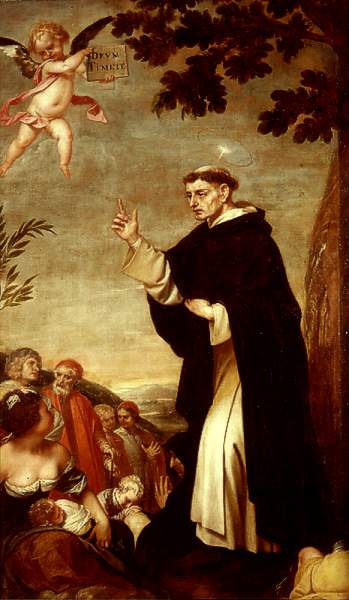
 The first semester of school year 2010-2011 I had a wonderful class of student theologians in the University of Santo Tomas, Manila: 38 students from different seminaries in the country and from various religious congregations of men and of women. Our subject of study was The Virtue of Justice in Christian Perspective.
The first semester of school year 2010-2011 I had a wonderful class of student theologians in the University of Santo Tomas, Manila: 38 students from different seminaries in the country and from various religious congregations of men and of women. Our subject of study was The Virtue of Justice in Christian Perspective.
After giving a panoramic view of justice – and injustice – today, we studied together the development of justice. In the first part of the course, the professor presented the biblical teachings on justice, the doctrines of the Fathers of the Church, the classical theology of justice from St. Thomas Aquinas, the social doctrine of the Church on justice and the current developments on justice. In the second part, the students analyzed various concrete themes of justice/injustice in our world: the marginalized (children, women, the elderly, and immigrants), violence and non-violence, the injustices of wars, the cultures of life and of death, justice and the Eucharist. The professor closed the course on justice by presenting other social virtues, including the virtues of truthfulness, gratitude, and frugality.
Among the questions for the final exams, the last one was the following: Has the treatise of justice influenced you in any way? Please write your answer. The answers of the young student theologians are enlightening and relevant for Christians, who are asked by St. Paul the Apostle to be “ministers of justice.†Let me share with you the most common answers and comments of my students.
Three of the most common answers refer to the biblical teachings on justice, particularly of the prophets and of the prophet Jesus. The teachings of the Bible on justice are on justice/love: no full justice without love, no true love without justice – and no authentic prayer without justice/love. On unconditional justice/love for all! In particular, justice and love for the oppressed, marginalized and poor.
From the Old Testament many students quoted in their answer to the final question the well known text from the prophet Micah: “This is what Yahweh asks of you: to act justly, to love tenderly and to walk humbly with the Lord†(Mi 6:8). From the New Testament, students remembered above all the parable of the Last Judgment, in particular these words: “Then the King will say to those on his right: ‘Come…, take for your heritage the Kingdom prepared for you… For I was hungry and you gave me food, I was thirsty and you gave me drink; I was a stranger and you made me welcome; naked and you clothe me; sick and you visited me; in prison and you came to visit me…’ I assure you, as often as you did it for one of my least brothers, you did it to me†(Mt 25: 31:40). The justice Jesus practiced and taught is fraternal or charitable justice, which is the justice of the Father of the prodigal son, a justice quite different from the justice of the elder son (Lk 15:11-32). It is also the justice of the owner of the vineyard who hired workers at dawn and through the day, and then pays the same salary to all the workers hired, regardless of the number of hours working in his vineyard (Mt 20:1-16).
After reflecting on the teachings of the Sacred Scriptures, we move to the teachings of the best representatives of Christian Tradition, the Fathers of the Church. We focused on the most important four Fathers on justice: the Greek Fathers Sts. Basil and John Chrysostom, and the Latin Fathers Sts. Ambrose and Augustine. One of the most common teachings of all the Fathers is this: God created the world for all and therefore all – every human being – have a right to a share in the goods of the earth. The text that surprised my students most was the following text of St. Basil (330-379), monk and pastor of the Church: “He who takes the clothes from a man is a thief. He who does not clothe the indigent when he can, does he deserve another name but thief? The bread that you keep belongs to the hungry; to the naked, the coat that you hide in your wardrobe; to the shoeless, the shoes that are dusty at you home; to the wretched, the silver that you hide. In brief, you offend all those who can be helped by you.â€
On our journey of the development of justice we made a stop to visit St. Thomas Aquinas (1225-1274), the common doctor of the Church and still, according to Vatican II, guide and exemplar for theologians today. St Thomas studies justice as one of the four cardinal virtues (with prudence, fortitude and temperance). Justice is a good habit, a social virtue that inclines us to give to each person what is due to him or to her. The most radical teaching of St. Thomas is his distinction between common and private property. Common property (community of goods) refers to the natural right of all to have a share in the goods created by God for all, while private property (individual appropriation) refers to the positive right of individuals to own something not only for their own use, but also for the use of others who are in real need. Provocative worlds of the angelic doctor: “The use or administration of the goods of the earth belongs to man. However, “no man is entitled to have things merely for himself, but for all, so that he is ready to share with others in case of needâ€(Summa Theologiae, II-II, 66, 2). St. Thomas adds that “in case of need, everything is in common†(II-II, 66, 7). In case of dire need, to take what is needed is not theft but restitution. St Thomas is also very much in favor of private property, not of a possessive privatizing property but of a property with an essential social dimension. A modern theologian comments: “Private ownership in the matter of the goods of the earth is only secondary and subordinate to common benefit: it exists only as a responsibility and a trust†(Mary O’Driscoll, OP).
After studying St. Thomas Aquinas we went to the Magisterium of the social doctrine of the Church on justice. The students presented the most relevant social documents of the Church on the matter: The 1971 Synod of Bishops’ Justice in the World, the teachings of Vatican II, of the Catechism of the Catholic Church and of the great social encyclicals, in particular, Leo XIII Rerum Novarum (1891), John XXIII Pacem in Terris (1963), John Paul II Laborem Exercens (1981), and Benedict XVI Deus Caritas Est (2005) and Caritas in Veritate (2009). Thereafter, we pointed out the social teachings of the Philippine Church, in particular of PCP II and of the Catechism for Filipino Catholics. We also reflected on – and this heightened my students’ attention – the social teachings which ground theologically Cardinal Gaudencio Rosales’ popular Pondo ng Pinoy.
We find in the social teachings of the universal Church and of the local Church the radical teachings of the Bible, the Fathers of the Church and St. Thomas Aquinas expressed in the relationship between justice and love, and in the principle of the universal destination of the goods of the earth, which is closely connected with two other basic principles, namely the principle of solidarity and the principle of the preferential love for the poor (see Vatican II, GS, 69).
On the relationship and close connection between justice and charity, some students recalled a text of Benedict XVI: “The just ordering of society and the State is a central responsibility of politics. As Augustine once said, a State which is not governed according to justice would be just a bunch of thieves… Love will always prove necessary, even in the most just society. There is no ordering of the State so just that is can eliminate the need for a service of love. Whoever wants to eliminate love is preparing to eliminate man as such. There will always be suffering which cries out for consolation and help. There will always be loneliness. There will always be situations of material need where help in the form of concrete love of neighbor is indispensable†(Deus Caritas Est, no. 28).
In this context, we underlined the need and beauty of almsgiving, that is, of authentic almsgiving: an act of true love that necessarily implies justice. Almsgiving without justice is a cover up of injustice. Words to ponder: “Works of charity (almsgiving without justice) are in effect a way for the rich to shrink their obligation to work for justice and a means of soothing their consciences, while preserving their own status and robbing the poor of their rights†(Benedict XVI, DCE, 26).
We rounded up our treatise on justice with a brief reflection on other social virtues, including truthfulness, gratitude, affability, generosity and frugality. Students remembered – and quoted correctly – two lovely texts: one, on gratitude; another on frugality (the disposition to be able to live with less). On the lovely virtue of gratitude: “When drinking water, remember its source†(Oriental saying). On the virtue of frugality or austerity: “Let us live simply so that others might simply live†(Canadian Bishops).
In our conclusion we pointed out the new way of understanding justice: not only as the virtue that inclines us to give to others what is their due, but also to give to others – to all others – their dignity and rights. In this context, my students underlined with John XXIII the need to speak not only of rights but also of duties, which are the correlative of rights. Our duty is to respect the rights of all, in particular of those who at the practical level do not yet have rights, such as children, women, the elderly and immigrants.
Let me close with another point repeated by my students in their final exam on justice: the day-to-day practice of justice. In fact, this is what matters most. After all, we study ethics or moral theology to be ethical and good Christians. One of the characters created by novelist André Brink says: “There are only two kinds of madness we should guard against: one is the belief that we can do everything; the other is the belief that we can do nothing.†We can and ought to do something: to be just and spread justice around us. As members of the human family, as brothers and sisters to one another we can light a candle. We can be just every day in our relationships with others. We can contribute a grain of sand in the peaceful struggle for more justice and solidarity in our world, in our societies, in our communities and, above all, in our souls. Indeed, “Acquire inner peace and thousands around you will find liberation.â€
FR. FAUSTO GOMEZ BERLANA, OP
Macau, December 2010

The most creative power given to the human spirit is the power
to heal the wounds of a past it cannot change.
We do our forgiving alone inside our hearts and minds;
what happens to the people we forgive depends on them.
The first person to benefit from forgiving is the one who forgives.
Forgiving happens in three stages: we rediscover
the humanity of the person who wronged us; we surrender
our right to get even; and we wish that person well.
Forgiving is a journey; the deeper the wound, the longer the journey.
Forgiving does not require us to reunite with the person who broke our trust.
We do not forgive because we are supposed to;
we frogive when we are ready to be healed.
Waiting for someone to repent before we forgive is to
surrender our future to the person who wronged us.
Forgiving is not a way to avoid pain but to heal the pain.
Forgiving someone who breaks a trust does not mean
that we give him his job back.
Forgiving is the only way to be fair to ourselves.
Forgivers are not doormats; to forgive a person is not a
signal that we are willing to put up with what he or she does.
Forgiving is essential; talking about it is optional.
When we forgive, we set a prisoner free and discover that
the prisoner we set free is ourselves.
When we forgive we walk in stride with our forgiving God.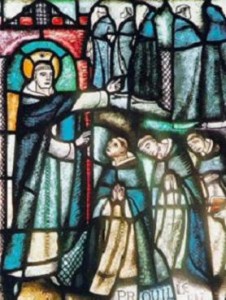

 Saint Paul School (Escola São Paulo) is a diocesan school run by the Dominican Fathers and one of the leading schools in Macau imparting education to a population of nearly three thousand students.
Saint Paul School (Escola São Paulo) is a diocesan school run by the Dominican Fathers and one of the leading schools in Macau imparting education to a population of nearly three thousand students.











